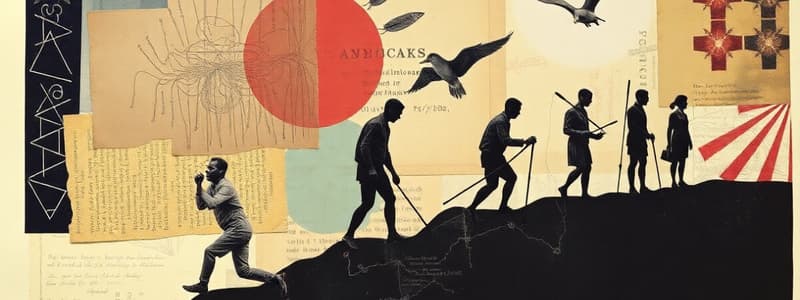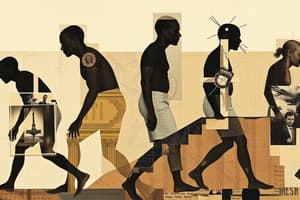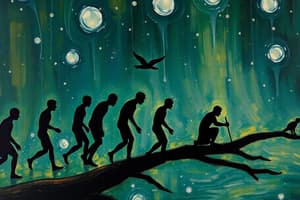Podcast
Questions and Answers
What is the primary definition of evolution?
What is the primary definition of evolution?
- A sudden change in the characteristics of an organism
- The modification of organisms due to external environmental factors
- The creation of new species purely by random chance
- The process by which new species develop from existing ones through successive generations (correct)
Which of the following best describes creationism?
Which of the following best describes creationism?
- A scientific theory explaining the origin of species
- A religious belief that God created man in His image (correct)
- An artistic representation of human origins
- A philosophical debate about life's origins
Which of the following is NOT one of the three evolutionary perspectives mentioned?
Which of the following is NOT one of the three evolutionary perspectives mentioned?
- Cultural perspectives (correct)
- Scientific perspectives
- Creationism
- Cosmogonic perspectives
What is xenocentrism?
What is xenocentrism?
Which statement accurately differentiates sociology from political science?
Which statement accurately differentiates sociology from political science?
What is a characteristic of culture related to material remains?
What is a characteristic of culture related to material remains?
What does the story of Malakas and Maganda represent in cultural mythology?
What does the story of Malakas and Maganda represent in cultural mythology?
How does sociocultural evolution differ from biological evolution?
How does sociocultural evolution differ from biological evolution?
What distinguishes humans from apes the most?
What distinguishes humans from apes the most?
Which hominid species is known to have appeared around 5 to 1 million years ago?
Which hominid species is known to have appeared around 5 to 1 million years ago?
What does the term 'Homo habilis' translate to?
What does the term 'Homo habilis' translate to?
About how much brain capacity does Australopithecus have compared to modern humans?
About how much brain capacity does Australopithecus have compared to modern humans?
Which feature is NOT characteristic of Ardipithecus?
Which feature is NOT characteristic of Ardipithecus?
Which species is considered the first to have used tools from tree branches?
Which species is considered the first to have used tools from tree branches?
What is the estimated time of divergence between the ancestors of humans and monkeys?
What is the estimated time of divergence between the ancestors of humans and monkeys?
What type of diet did Australopithecus primarily have?
What type of diet did Australopithecus primarily have?
What does the term 'natural selection' primarily describe?
What does the term 'natural selection' primarily describe?
Who is credited with developing the theory of evolution through natural selection?
Who is credited with developing the theory of evolution through natural selection?
What does the phrase 'survival of the fittest' imply in the context of evolution?
What does the phrase 'survival of the fittest' imply in the context of evolution?
Which of the following best describes biological evolution?
Which of the following best describes biological evolution?
What was one source of evidence that led Charles Darwin to question divine creation?
What was one source of evidence that led Charles Darwin to question divine creation?
Which statement about genetics is accurate in the context of evolution?
Which statement about genetics is accurate in the context of evolution?
Which of the following figures is associated with separating heaven and earth in creation mythology?
Which of the following figures is associated with separating heaven and earth in creation mythology?
How does Darwin's theory differ from the notion of divine creation?
How does Darwin's theory differ from the notion of divine creation?
Study Notes
Biological and Socio-Cultural Evolution
- Evolution is the process of change in living organisms over time.
- Creationism: The belief that the universe and all living things were created by a supernatural being or beings.
- Cosmogonic: Beliefs about the origin and structure of the universe, often expressed through myths and folktales.
- Scientific Perspective of Evolution: The theory that humans have evolved from ape-like creatures, supported by fossil evidence and genetic analysis.
Biological Evolution
- Biological evolution is the changes in inherited traits of a population from one generation to the next.
- Natural Selection: The process where organisms better adapted to their environment more likely to survive and reproduce.
- Survival of the Fittest: A term coined by Herbert Spencer, emphasizing the advantages of traits that promote an organism's success in its environment.
- Genetics: The science of heredity, explaining variations in species and their inheritance.
Hominid Species Timeline
- Sahelanthropus: (6-7 million years ago) An early hominid with a skull similar to Australopithecus and modern humans, but with a smaller brain size.
- Ardipithecus: (5.6-4.4 million years ago) Ardipithecus had a smaller brain size than humans but were ape-like bipedal, with a smaller brain and a height of 4 feet.
- Australopithecus: (5-1 million years ago) “southern ape” with a brain size about 1/3 of modern humans, used sticks and stones for tools, and were food scavengers.
- Homo Habilis: (3 - 4 million years ago) "handy man" known for tool making from tree branches.
- Homo Erectus: (1.8 million - 117,000 years ago) Known for their larger brains, greater heights, and migration out of Africa.
- Homo Sapiens: (200,000 years ago - present) Our species, known for complex language, advanced technology, and cultural development.
Understanding Humans and Monkeys
- Monkeys and humans did not evolve from one another, but share a common ancestor that lived around 25 million years ago.
- Humans and monkeys share about 93% of their DNA, reflecting a close evolutionary relationship.
Studying That Suits You
Use AI to generate personalized quizzes and flashcards to suit your learning preferences.
Related Documents
Description
Explore the fascinating concepts of biological evolution and socio-cultural development in this quiz. Test your knowledge on the processes of natural selection, creationism, and genetic variations. Understand how these principles explain the diversity of life on Earth and our evolutionary heritage.




